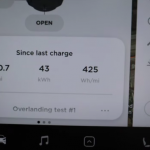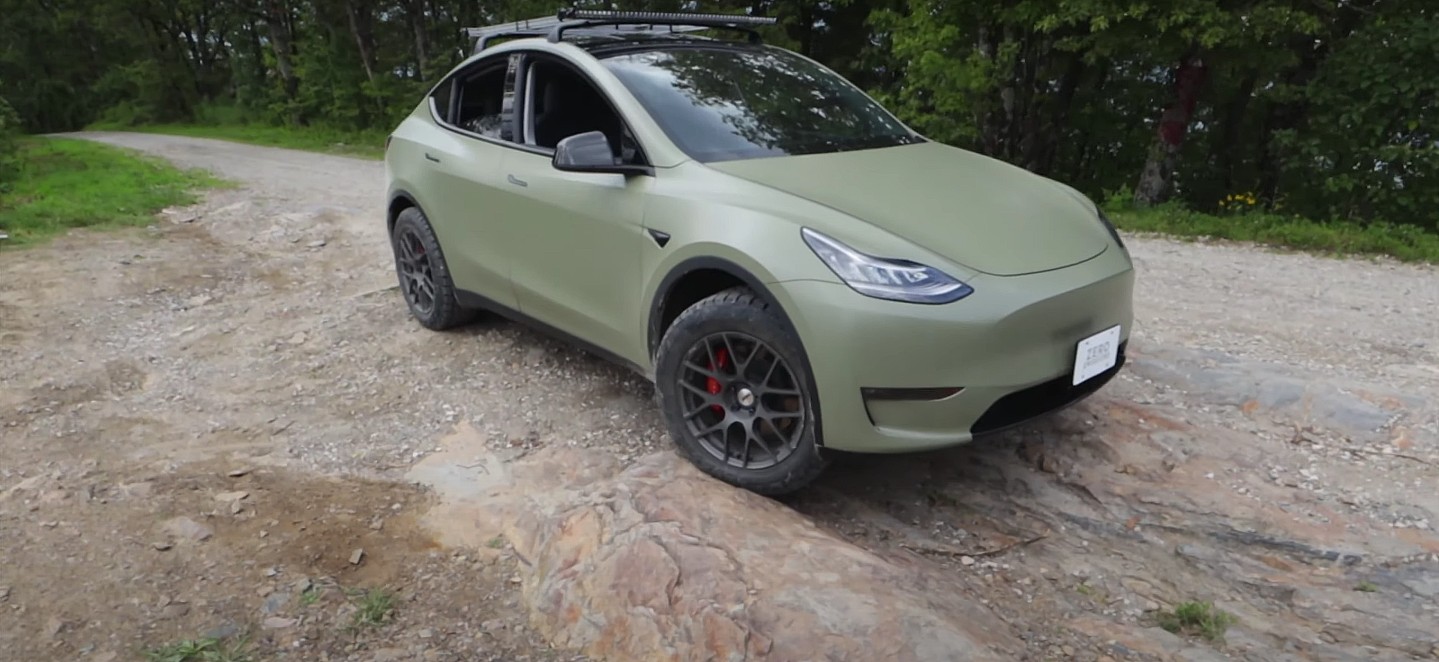
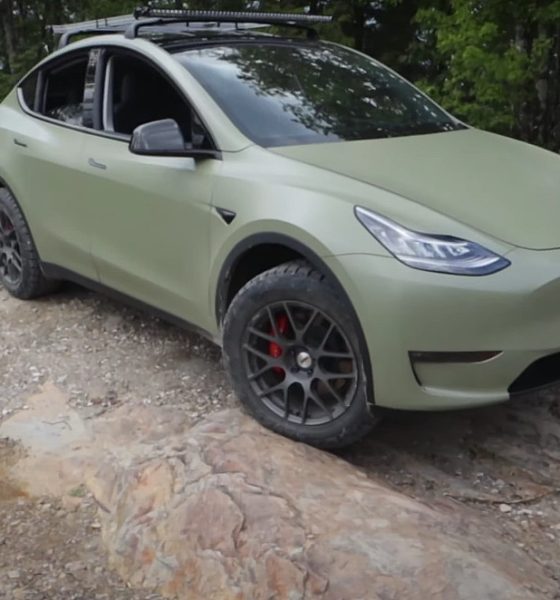
News
Tesla owner lifts Model Y in wicked off-road conversion
The Tesla Model Y is a quick and sleek crossover powered by an all-electric, but that doesn’t mean that the vehicle can’t handle rough and rugged trails in the mountains with the help of a lifted suspension and the company’s “Off-Road Assist” feature.
Brian Jenkins of the i1Tesla YouTube channel took his Model Y Performance into the North Carolina mountains to see if Tesla’s newest vehicle could handle the challenging terrain. Jenkins has made several modifications to his Model Y, which he refers to as the “Overlanding Build,” that would encourage the car to perform adequately in an off-road setting.
Jenkins installed a 4-inch suspension lift from Mountain Pass Performance to increase ground clearance, All-Season Toyo A/T III tires, aftermarket rims from TSW, and an Earthy-themed combat green wrap to his Model Y. With these modifications, he was ready to assess the capabilities of his electric crossover in a terrain.
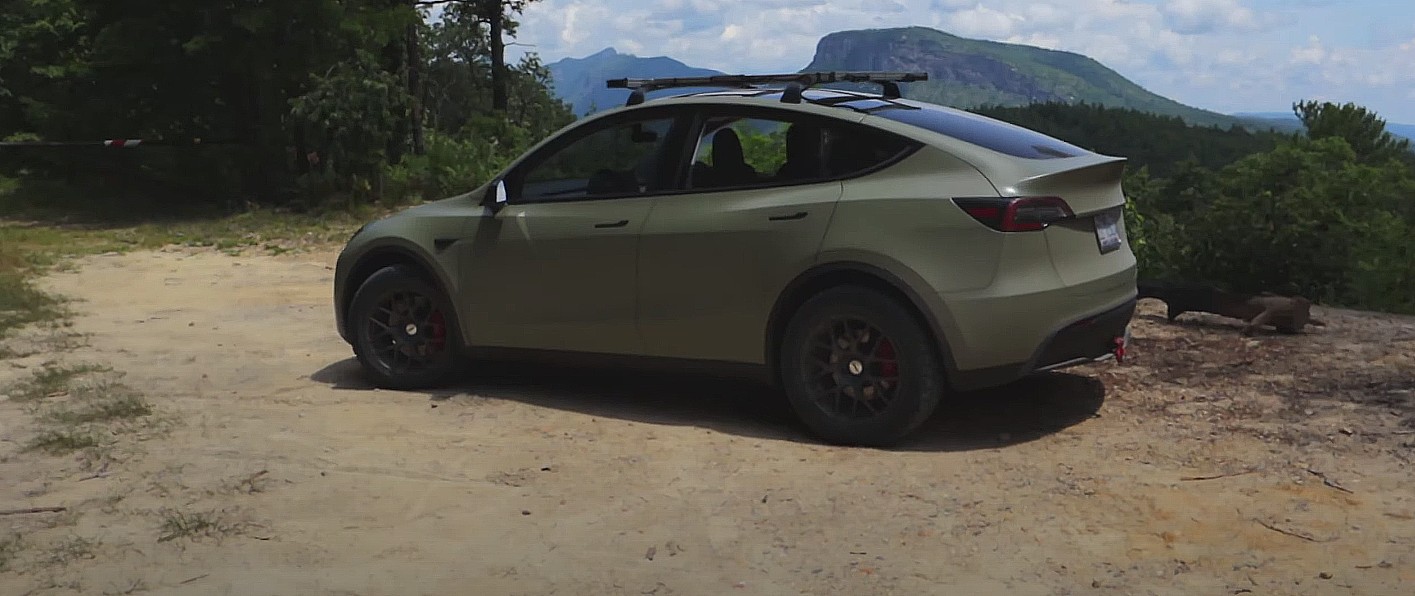
Jenkins used 31-inch all-terrain tires from Toyo for increased confidence when maneuvering through the tough trails of the mountains. “These are probably the biggest tires you can put on a Tesla,” he said.
He also elaborated that the vehicle is not necessarily geared for off-roading, but more of an Overlanding style of driving. Overlanding describes a trip that requires traveling to remote destinations where journeying is the primary goal. Jenkins believes that the purpose of Overlanding captures his vehicle’s essence perfectly.
“That is what the Tesla is all about as far as going on trips. What better way to go off-road or into the wilderness than with a zero-emissions vehicle. Enjoy the adventure!”
To help the cause and test some of the Model Y’s unique features, Jenkins activated Tesla’s “Off-Road Assist” functionality, which improves traction and helps with overall improvements when driving on tricky terrains. The feature also works to balance the torque between and front and rear motors, which also increases traction during operation.
The Overlanding-geared Model Y encountered many tests during its session of driving. Steep hills covered with small rocks and small gullies that have damaged roadways were among the first terrain challenges that the all-electric crossover faced.
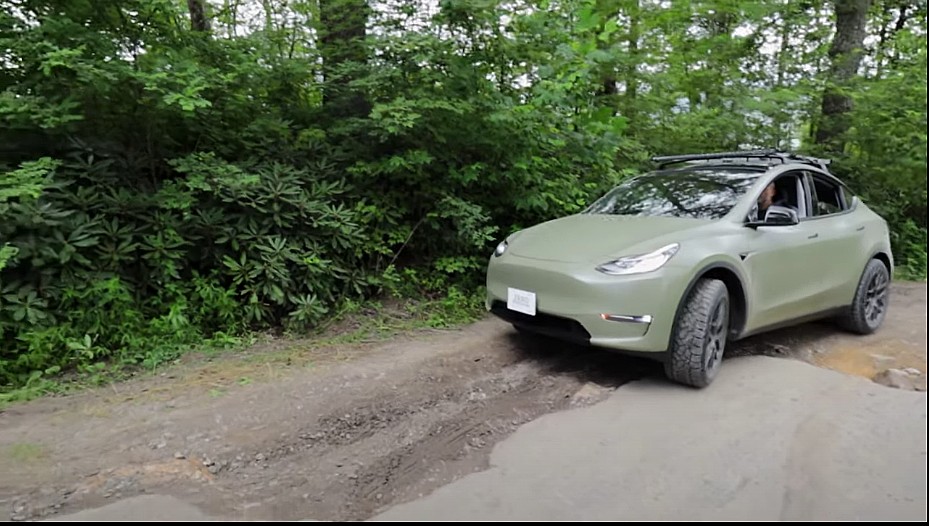
The steep terrain, nor the gulley managed to provide any challenges for Jenkins’ Model Y, as the vehicle was able to handle the deep divots in the road and the small rocks. Thanks to the upgrades that Jenkins made, combined with the confidence that the Off-Road assist feature provides, there was no issue with the electric car making its way through the problematic settings that it encountered.
Ultimately, Jenkins and his Tesla Model Y were able to climb the 3,400-foot mountain and reach the top. Along the way, the Model Y burned 38% battery, starting at 90% and reaching the peak at 52%. Thanks to Tesla’s regenerative braking system, the Model Y lost only 3% during the journey down the mountain.
- Jenkins and his son after conquering the 2,900-foot ascension up the North Carolina mountains. (Credit: YouTube | i1Tesla)
- The energy usage during Jenkins’ Model Y trip up the North Carolina mountains. (Credit: YouTube | i1Tesla)
The total trip was 100.7 miles, and the Model Y used 43 kWh of energy during its 3,800-foot journey up and back down of the North Carolina mountains.
The Model Y was geared toward offering a sustainable crossover SUV from Tesla that would take a chunk out of the most popular vehicle segment in the United States. However, it is more than a grocery getter or a car to take the kids to soccer practice because it is capable of handling tough off-road terrain with relative ease. The test from Jenkins shows the all-electric crossover can handle difficult stretches of road, while still offering efficiency and world-class performance.
Watch Jenkins’ full Model Y climb in the mountains of North Carolina below.

News
Tesla rolls out new Supercharging safety feature in the U.S.
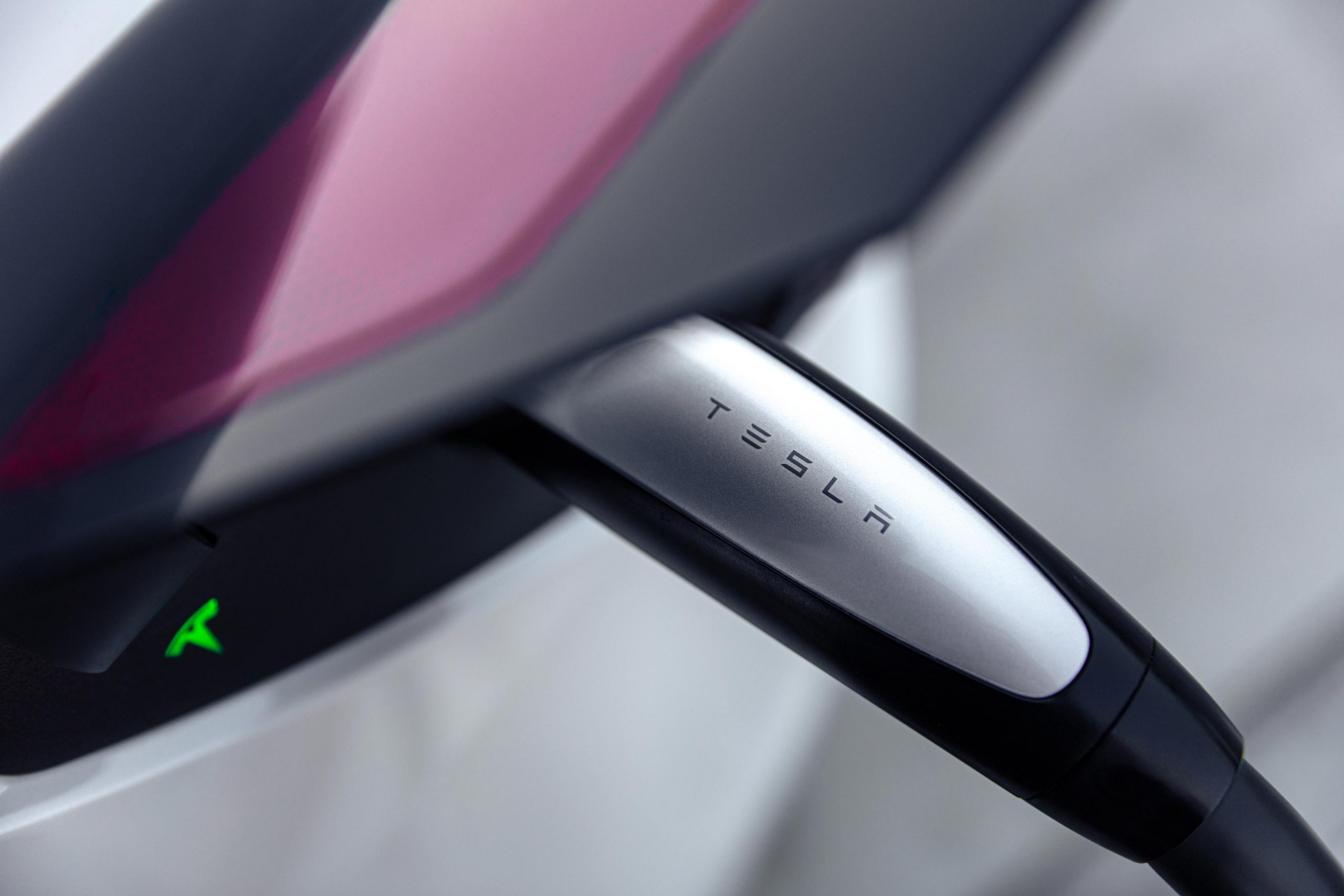
Tesla has rolled out a new Supercharging safety feature in the United States, one that will answer concerns that some owners may have if they need to leave in a pinch.
It is also a suitable alternative for non-Tesla chargers, like third-party options that feature J1772 or CCS to NACS adapters.
The feature has been available in Europe for some time, but it is now rolling out to Model 3 and Model Y owners in the U.S.
With Software Update 2026.2.3, Tesla is launching the Unlatching Charge Cable function, which will now utilize the left rear door handle to release the charging cable from the port. The release notes state:
“Charging can now be stopped and the charge cable released by pulling and holding the rear left door handle for three seconds, provided the vehicle is unlocked, and a recognized key is nearby. This is especially useful when the charge cable doesn’t have an unlatch button. You can still release the cable using the vehicle touchscreen or the Tesla app.”
The feature was first spotted by Not a Tesla App.
This is an especially nice feature for those who commonly charge at third-party locations that utilize plugs that are not NACS, which is the Tesla standard.
For example, after plugging into a J1772 charger, you will still be required to unlock the port through the touchscreen, which is a minor inconvenience, but an inconvenience nonetheless.
Additionally, it could be viewed as a safety feature, especially if you’re in need of unlocking the charger from your car in a pinch. Simply holding open the handle on the rear driver’s door will now unhatch the port from the car, allowing you to pull it out and place it back in its housing.
This feature is currently only available on the Model 3 and Model Y, so Model S, Model X, and Cybertruck owners will have to wait for a different solution to this particular feature.
News
LG Energy Solution pursuing battery deal for Tesla Optimus, other humanoid robots: report
Optimus is expected to be one of Tesla’s most ambitious projects, with Elon Musk estimating that the humanoid robot could be the company’s most important product.
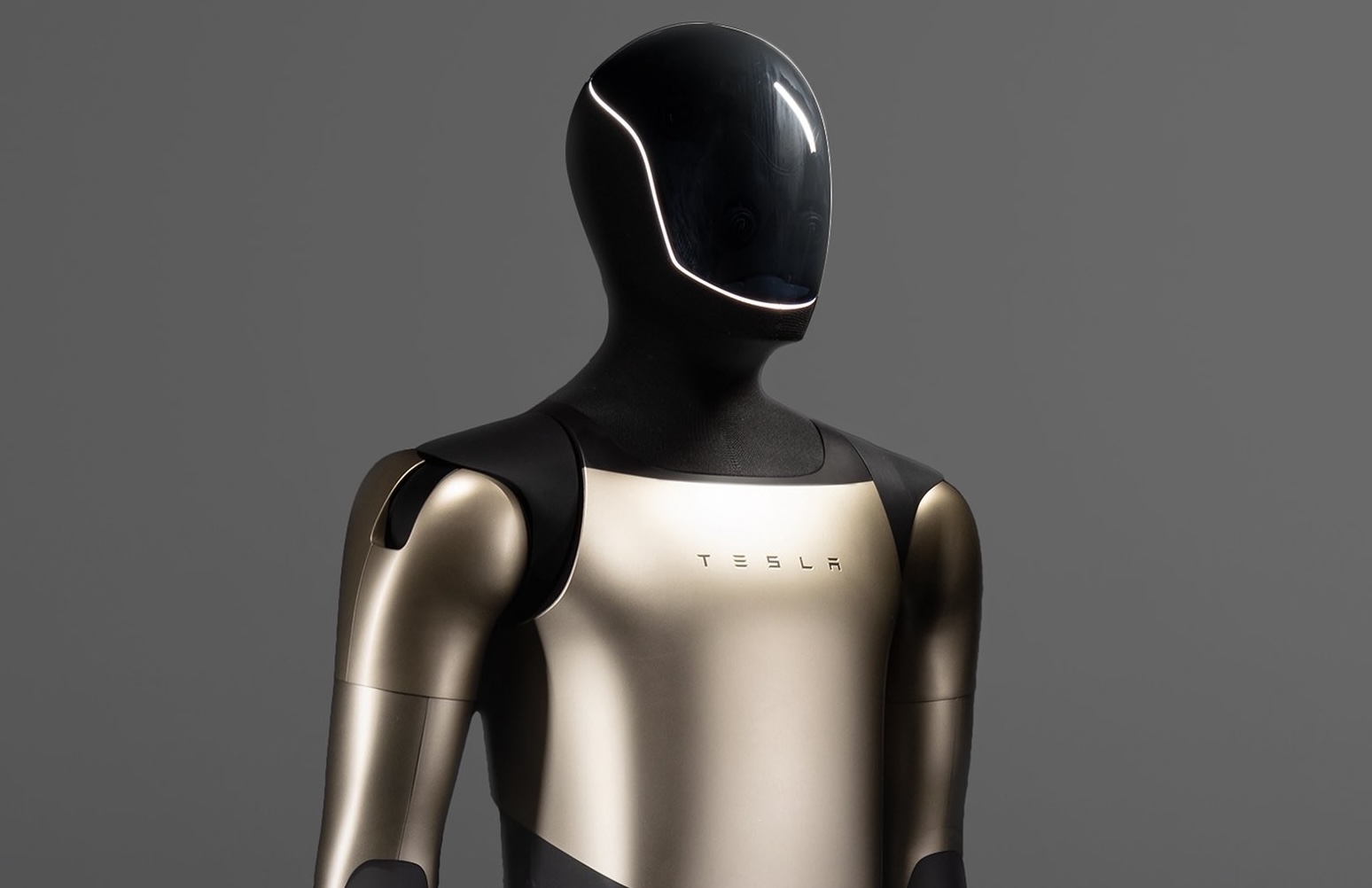
A recent report has suggested that LG Energy Solution is in discussions to supply batteries for Tesla’s Optimus humanoid robot.
Optimus is expected to be one of Tesla’s most ambitious projects, with Elon Musk estimating that the humanoid robot could be the company’s most important product.
Humanoid robot battery deals
LG Energy Solution shares jumped more than 11% on the 28th after a report from the Korea Economic Daily claimed that the company is pursuing battery supply and joint development agreements with several humanoid robot makers. These reportedly include Tesla, which is developing Optimus, as well as multiple Chinese robotics companies.
China is already home to several leading battery manufacturers, such as CATL and BYD, making the robot makers’ reported interest in LG Energy Solution quite interesting. Market participants interpreted the reported outreach as a signal that performance requirements for humanoid robots may favor battery chemistries developed by companies like LG.
LF Energy Solution vs rivals
According to the report, energy density is believed to be the primary reason humanoid robot developers are evaluating LG Energy Solution’s batteries. Unlike electric vehicles, humanoid robots have significantly less space available for battery packs while requiring substantial power to operate dozens of joint motors and onboard artificial intelligence processors.
LG Energy Solution’s ternary lithium batteries offer higher energy density compared with rivals’ lithium iron phosphate (LFP) batteries, which are widely used by Chinese EV manufacturers. That advantage could prove critical for humanoid robots, where runtime, weight, and compact packaging are key design constraints.
News
Tesla receives approval for FSD Supervised tests in Sweden
Tesla confirmed that it has been granted permission to test FSD Supervised vehicles across Sweden in a press release.
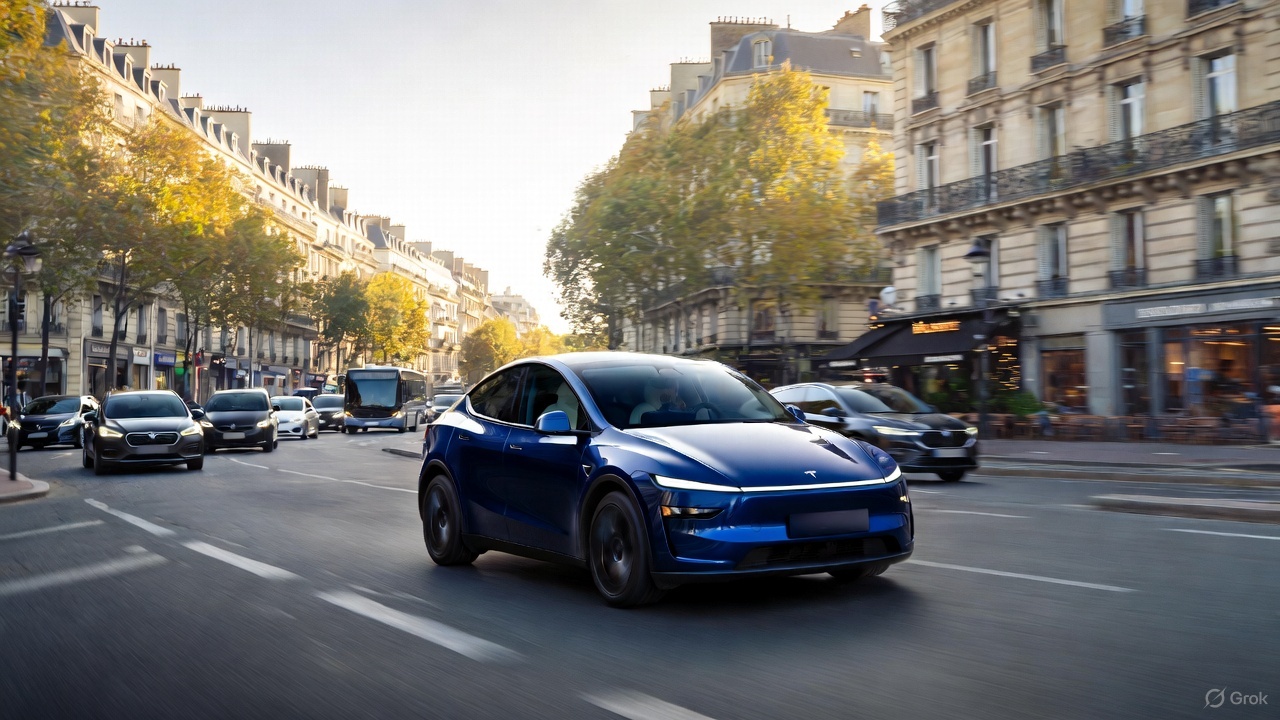
Tesla has received regulatory approval to begin tests of its Full Self-Driving Supervised system on public roads in Sweden, a notable step in the company’s efforts to secure FSD approval for the wider European market.
FSD Supervised testing in Sweden
Tesla confirmed that it has been granted permission to test FSD Supervised vehicles across Sweden following cooperation with national authorities and local municipalities. The approval covers the Swedish Transport Administration’s entire road network, as well as urban and highways in the Municipality of Nacka.
Tesla shared some insights into its recent FSD approvals in a press release. “The approval shows that cooperation between authorities, municipalities and businesses enables technological leaps and Nacka Municipality is the first to become part of the transport system of the future. The fact that the driving of the future is also being tested on Swedish roads is an important step in the development towards autonomy in real everyday traffic,” the company noted.
With approval secured for FSD tests, Tesla can now evaluate the system’s performance in diverse environments, including dense urban areas and high-speed roadways across Sweden, as noted in a report from Allt Om Elbil. Tesla highlighted that the continued development of advanced driver assistance systems is expected to pave the way for improved traffic safety, increased accessibility, and lower emissions, particularly in populated city centers.
Tesla FSD Supervised Europe rollout
FSD Supervised is already available to drivers in several global markets, including Australia, Canada, China, Mexico, New Zealand, and the United States. The system is capable of handling city and highway driving tasks such as steering, acceleration, braking, and lane changes, though it still requires drivers to supervise the vehicle’s operations.
Tesla has stated that FSD Supervised has accumulated extensive driving data from its existing markets. In Europe, however, deployment remains subject to regulatory approval, with Tesla currently awaiting clearance from relevant authorities.
The company reiterated that it expects to start rolling out FSD Supervised to European customers in early 2026, pending approvals. It would then be unsurprising if the company secures approvals for FSD tests in other European territories in the coming months.

